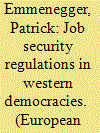|
|
|
Sort Order |
|
|
|
Items / Page
|
|
|
|
|
|
|
| Srl | Item |
| 1 |
ID:
120144


|
|
|
|
|
| Publication |
2013.
|
| Summary/Abstract |
European labour markets are often described as rigid with comparatively high levels of job protection that do not allow for the flexible adjustment of employment to economic fluctuations. This interpretation overlooks important sources of flexibility, however. Research has shown that recent labour market policy reforms have allowed for the creation of two-tier labour markets consisting of insiders in standard employment relationships and outsiders in non-standard employment. This outcome has typically been explained by pointing to the representational interests of unions or social-democratic parties. It has been argued that rather than protecting all labour market participants, unions and social-democratic parties focus on the interests of their members and their core constituency, respectively, most of whom are in standard employment relationships. In contrast, it is argued here that unions' institutional power resources are the crucial variable explaining this outcome. In difficult economic times, when unions are asked to make concessions, they will assent to labour market reforms, but only to those that do not fundamentally threaten to undermine their organisational interests. In the context of job security legislation, this means that unions defend the protection of permanent contracts while they compromise on the regulation of temporary employment. This 'second best solution' allows them to protect their organisational interests, both by retaining their institutional role in the administration of dismissals and by living up to their institutional role as one of the organisations responsible for the direction of labour market policy reform. Using fsQCA this article shows that unions' institutional power resources are more apt to explain the observed two-tier reform pattern than the unions' or the social-democratic parties' representational interests.
|
|
|
|
|
|
|
|
|
|
|
|
|
|
|
|
| 2 |
ID:
103359


|
|
|
|
|
| Publication |
2011.
|
| Summary/Abstract |
This article uses fuzzy set qualitative comparative analysis (fsQCA) to examine the determinants of job security regulations - here understood as restrictions on hiring and firing - in Western democracies. Unlike previous studies, the analysis reveals three different paths to high levels of job security regulations. The first path covers the Southern European state capitalist countries. In these countries, conflicts between forces pushing for liberal democracy and groups alienated from modernisation have led to high levels of statism and crowded out other societal actors. Job security regulations were enacted relatively early in order to provide social security by means available to the state. Due to fragmented welfare states, job security regulations have remained one of the most important pillars of the social protection regime. The second path covers the Continental European managed capitalist countries and is also characterised by high levels of statism. In these countries, repressive governments employed a stick-and-carrot strategy to weaken the labour movement and tie the loyalties of the individual to the state. After the Second World War, these countries developed corporatist intermediation systems and encompassing and generous welfare states. Finally, the third path covers the Nordic managed capitalist countries. This path is characterised by a high degree of non-market coordination, strong labour movements and few institutional veto points. In the Nordic managed capitalist countries, job security regulations traditionally have been subject to collective agreements. However, in the 1960s, labour movements succeeded in pushing through the public legislation of job security despite opposition from employers' associations. Methodologically, this article demonstrates that cross-national differences in the level of job security regulations can only be explained if the methods used allow for complex causality. In contrast, methods which focus on 'net effects' do not offer satisfactory explanations for the cross-national differences in the level of job security regulations.
|
|
|
|
|
|
|
|
|
|
|
|
|
|
|
|
|
|
|
|
|